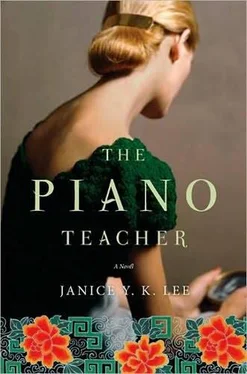He worked odd hours and tried to get glimpses of Locket, but the Chens always had the other drivers take her to school. Despite himself, he looked at her face, looking for signs of what? Trudy, yes, but also what he could not voice in his own head.
One day, Victor got in the car and directed Will to drive to the Peak. On the way up, he had seemed agitated, fidgeting with papers in the backseat.
“Mistakes were made,” he said suddenly, opaquely.
Will had not answered, which had made Victor more jumpy.
“Do you know what I’m talking about?” he had asked.
“No.”
“In times of war, there are many decisions that are made, and things that get done without the benefit of reflection.”
“Yes, sir,” he had replied, his deference more threatening than anything he could have said. He saw Victor’s face in the rearview mirror. He was perspiring heavily.
“I’ve had some news…” Victor started.
“Yes, sir,” he repeated.
Victor hesitated, then seemed to get ahold of himself.
“At any rate, Will, the war has changed all of us. We’re all in this together now.”
Will remained silent.
“I’ve changed my mind, Will. You can take me home now.”
Will swung the car around and took Victor home. They didn’t speak on the return journey. His wages were suddenly doubled. Will never found out what had spooked Victor but neither he nor Victor ever mentioned the ride again.
He was waiting for something to happen. And in the meantime, he remembered.
***
Trudy and Dominick locked in a terrible embrace.
Funny how so many things seem inevitable, given enough distance. Put a girl and a boy of similar persuasions together in summer and see what evolves. Usually love. Two friends, equally matched, and then one suddenly has an advantage: rarely will they remain friends. This must have been what happened. Trudy and Dominick, alike as two peas in a pod when things were good. When the situation turned fraught, each reverted to form. Trudy essentially good, Dominick an animal. The betrayal sharp.
But his own? Much worse. He knows.
“I forgive you,” she says. “I understand.”
He clings to this. Hears her say it over and over.
How can he leave her now?
A WOMAN IS SITTING in a chair, reading by a window. A cup of tea has gone cold beside her. Dusk is gathering outside, and when it becomes too difficult to see, she goes to turn on the light. The room is suddenly illuminated.
She lives by herself now, in a small apartment she has found in Wan Chai, amid locals and wet markets. It is furnished simply, with an iron bed and a thin mattress, a wooden fruit crate for a bedside table, a lamp she bought at Dodwell’s during the holiday sales. She has a comfortable reading chair as well. She lives very frugally, within her means as a secretary for a shipping company, and she has found that it is possible to live like a local, on almost nothing, bargaining for everything from lightbulbs to tea towels. She buys one orange at a time, or two carrots, or picks her own chicken to be killed, a purchase that will last her three days. She eats at the street stalls: noodles and congee and roasted meats and other dishes she would have found unappealing just a year before. She can wield chopsticks now with the best of them. Sometimes, as she sits on the stools, next to a taxi driver or a shopkeeper, she listens and finds she can understand some of what they are saying; words emerge from the noise, like jewels. In the beginning, she was a curiosity to them, but now they have seen her enough to ignore her. Her Cantonese-still rudimentary-is improving. Now she can order at the daipaidong , and they will not repeat the order loudly, in English; they just grunt and dump the noodles in the broth to boil, same treatment as the locals.
At home, she sometimes wears the black trousers and white tunics-the amah uniform-as night clothes and finds them oddly comfortable. They are made of light cotton and are very inexpensive. The shop owner had assumed she was buying them for her amah and kept asking how tall, gesturing with her hands. Claire held the cloth against her frame and nodded her head. The first day she spent in her flat, she walked down to the local street barber and sat down, much to his surprise, and asked him to cut her hair short all around.
And she knows the streets of the town-Johnston, Harcourt, Connaught -and how to say them in Cantonese. They are like a web of veins emanating out from Central to Repulse Bay, the Peak, Mid-Levels, places she rarely goes now, places filled with English people and the lives they lead. She runs into people she knows now and then, and they always ask how she is doing, in that searching, curious way, and she just nods and says fine, she is doing fine, enjoying the city very much. But are you going home? they ask, and she says no, she has no plans to go home at the moment.
She is talked about less and less. She is becoming a part of some old history that will soon be forgotten, and this suits her well.
Sometimes she is lonely, but she frequents the library at the Auxiliary, taking out three or four books at once. There are so many things to know and learn. She reads about Beethoven, Chinese rice farming, biographies of English prime ministers, and finds comfort in the fact that she will never run out of books. There is also a piano there, and the manageress has told her she can play after hours if she arranges it beforehand. She has been going there in the early evening, when the heat is less, and playing for an hour or so, while the staff cleans up around her. She goes late enough so that all the women she would know have already finished with their tea and gone home to prepare for supper, husbands and children gathering at home, filling the rooms with chatter and noise, so unlike her own.
Martin is still in Hong Kong, as far as she knows. She had stayed at the flat with him for a few days while she was finding her own quarters, a request she had brought up when he had come home, ashen-faced, after the party. He had not said yes but he did not say no. She knew it was more than generous of him. She had poured neat whiskey into two glasses and sipped it with him in silence. She remembered still his posture. He sat heavily at the table, drinking slowly, and fingered the edge of the linen coaster. Yu Ling hovered excitedly near the kitchen door, listening for anything, having already been informed by telephone, before either had arrived home, of the scandalous situation through the lightning-quick amah network.
And he hadn’t had the stomach for questions. He wanted her to volunteer the information but she could not bring herself to talk to him. For the first few days, his cold silence when he returned home was welcome; it was when he began to try to talk to her and understand what had happened that she couldn’t stand it. She slept on the sofa in the living room, and tried to wake before Yu Ling got up, so that she could put away the pillow and the blankets, but too often she had seen the amah’s curious eyes watching her as she woke. She supposes, in Yu Ling’s world, such a situation would be settled with a chopper, and that she and Martin seem bloodless, bizarre to her.
Then Martin: “Were you unhappy?” The first sentence he had spoken to her since that night. He had come into the living room from their bedroom; she had been reading.
And what could she have said? She put down her book and tried to think of the answer. She found the question too prosaic, and hated herself for that.
“I needed to believe there was more to life.” Said simply. The fanciful notion an affront to good values, and she all too aware of it.
“Where did you go?” His second question. He sat down at the dining room table, far from her. He rubbed at his eyes.
Читать дальше












